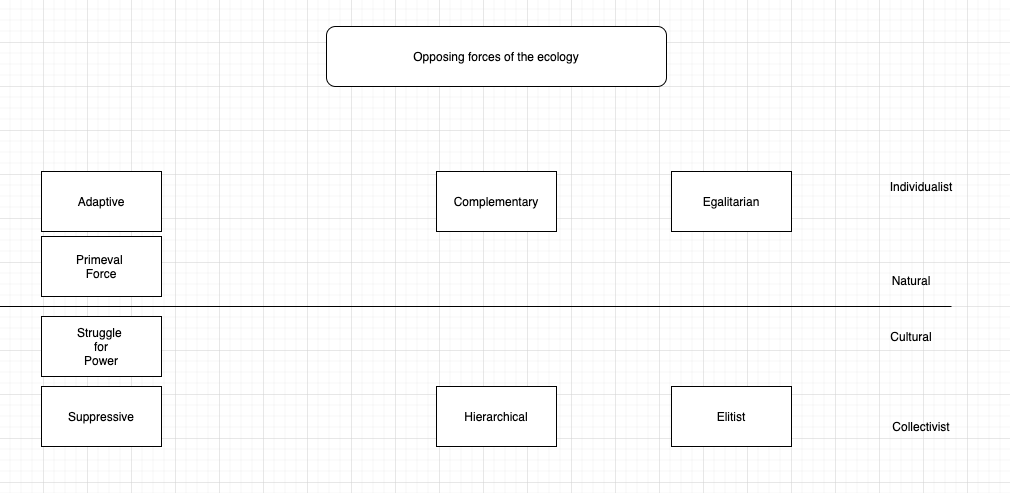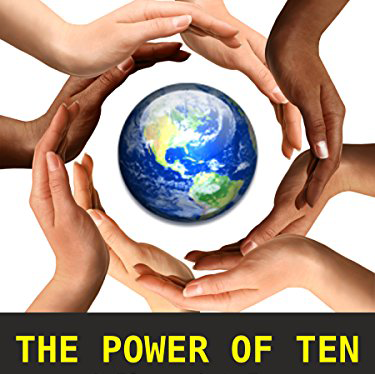Korte verhalen
On the way to Good is Good Enough
Mankind’s mastery over nature stood a great chance with limited demands on nature. Because of developments mainly in population growth and reinforced by materialistic demands, we now have to take recourse on domination of nature, on dominating the planet, and the planet is defending itself. This opposes the primeval forces of nature to the power struggles of culture.
Ever since humankind abandoned its status of hunter-gatherer and started to develop its attempts to make nature conform to its desires and wishes, to make a comfortable home out of our planet earth, we have developed our culture to master the challenges of nature. As such humankind distinguishes itself from other lifeforms by its culture of continually adapting its environment to its needs, whereas other lifeforms evolve as they adapt themselves to their environment.
Nature by and large tends to strive for balance. If overpopulation of a certain species threatens, a disease or food shortage will decimate its numbers to well below the sustainable level and a new cycle of growth can begin, until history repeats itself. All around a certain level of sustainability that natural things never maintain. This continuous dynamic gives the planet a lot of flexibility in maintaining its own balance in a normal but dynamic distribution around an average.
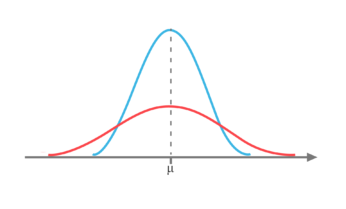
Fig. 1: Nature continually evolves around a normal distribution.
Within that complex system there was, for a long time, enough resilience to cope with a species of a limited number with its culture of trying to shape things according to its liking. Enough resilience to hide for a long time that it was doing so at the expense of natural resources and the ecosystem of the planet; hiding that this culture was stimulated by people denying that the ecology is about an interplay of planet and species.
From the period of Industrialism this resilience started to erode as people began to treat the planet as something they can dominate and shape. The mere mastery of nature turned into a need to dominate the ecosystem and that woke up the primeval force of nature to defend itself against this brutal force. Nature will try to restore its balance by decimating the brutal dominators. Dominators who have lost the incentive of safeguarding an ecology and are actually even overwhelmed by the complexity of developments of the established order forcing them to seek recourse in reliance on artificial intelligence and algorithms to maintain a modicum of overview.
Humankind consists of thinking beings. More than any other species on the planet it has the capability of contemplative thought. Also, more than any other species, it has organized itself in a hierarchical order, where the development of that capability is stifled instead of stimulated. That established order knows no bounds when it comes to its unlimited demands on the reserves of the limited planet. Instead of using its thinking capabilities to establish what and how much the planet can afford to give and take on a sustainable level, the high priests of the established order seek to achieve dominion by maximising their wealth. They are not interest in their share of available wealth, but in the maximisation of wealth full stop.
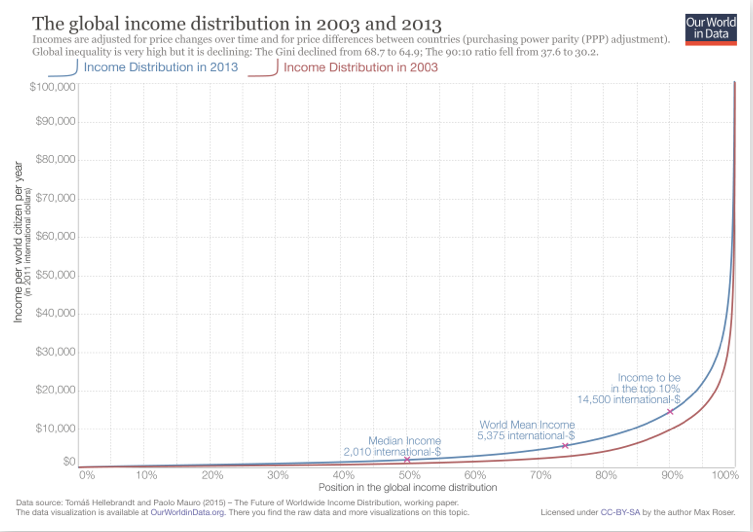
Fig.2: the asymmetrical distribution of income
The unlimited demands of the final percent of the world’s population on what is distributed as income, will not lead to a more equitable distribution of wealth; on the contrary. The wealthiest 1% now own more of the world’s accumulated wealth than the remaining 99% combined. Their goal is not to achieve a status where they have enough, but to have ever more, probably to have the most.
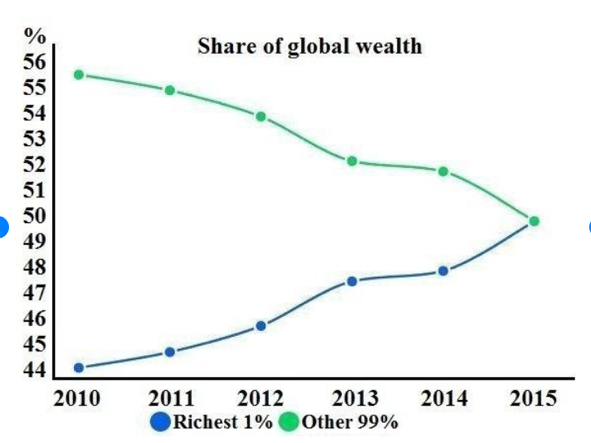
Fig. 3: the incomprehensible division of wealth
The ecology cannot handle this pointless exercise of greed and will respond. Actually, it is already responding. The price of that response will be borne by the most disadvantaged in society unless humankind comes to its senses and starts using its unique qualification: Its ability to think, to be reasonable. To get to that point major change is needed. Change that will not be instigated by those battling for dominance but should come from the population at large as they insist on a more equitable and sustainable way of life.
This doesn’t mean that wealth should be distributed equally. There will always be an asymmetrical appreciation of efforts, but it should be within a limited, understandable, sustainable burden on the ecology. The division should guarantee an acceptable standard of living for those on the minimal side of things and probably accept some form of asymmetry in its deviation from a normal distribution of wealth.
This calls for a complete deviation from todays’ established order. An order that was established in ancient times, thousands of years ago that took precedence over the ecology without too damaging consequences as long as the total demands were within range of adaptability of the planet. Bringing those demands back within range is the only reasonable and justifiable way forward for humankind. The hierarchy of society makes such a dramatic change extremely unlikely to succeed. That doesn’t make it a less attractive alternative, just a daunting enterprise that has to start somewhere. That somewhere has to be the field of education, as its success will depend on the emancipation of those who will pay the price of the suspected ultimate failure of the established order to provide for all.
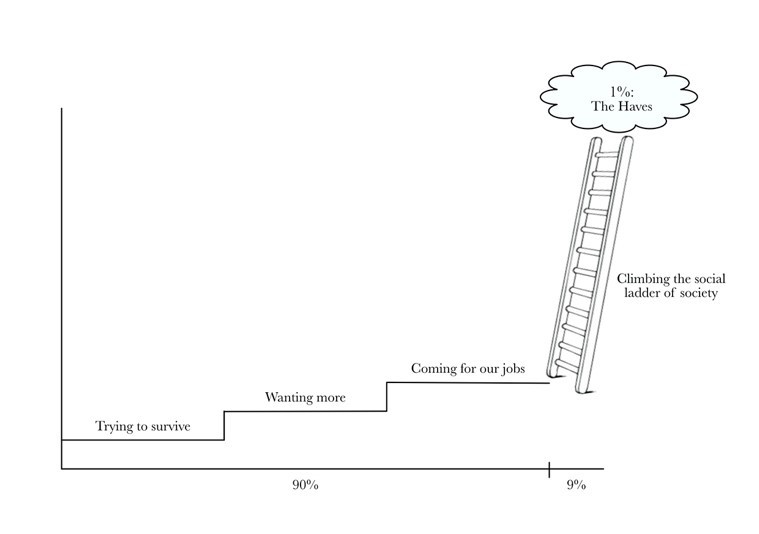
Fig. 4: An image of societal hierarchy.
Education should take us away from the cultural hierarchy towards a more equitable way of living, making us understand that Good is Good Enough can be a more rewarding yardstick of the quality of life for the many than the wild-goose chase for ever more by the few. As we speak about changing something that is almost engrained in our DNA such change can only be achieved over time, over the course of generations. That needs a motivation sustained over that period.
Traditionally the motivation for life came for the afterlife. Suffer here and enjoy later. Different forms of religion and culture have preached such future rewards and in doing so have ended up being a formidable divisive force in society based on beliefs and supposed superiority of the chosen. Such divisions and its resulting “divide and conquer” help the established order in its continuation of its vain existence, but not the people nor the planet. Political ideologies whether based on sharing or appropriation have the same outcome and yet again benefit the few at the expense of the total ecology. All are instruments to support an established societal practice that pitches the hierarchy against the equality, not sameness, no interchangeability, but equality.
The essential question is whether the numerical force, the people at large, can be made to believe that they not only can but should be allowed to be heard. Whether an image can be created that is strong enough to make the sustained effort worthwhile, without derailing into a divisive ideology. A change in the attribution of responsibility over time somewhere between absolutism and anarchy towards a more equitable society based on thought and not on the hierarchy of knowing best, as that ‘best’ is usually self-serving and never good enough. Whether an image can be created that by assuming part of the responsibility for the order of things, by accepting the burden that comes along with that, the ultimate reward could be a better life.
This would have to come from the understanding of the unsustainability of the established order. By the fear for that or the hope for a more rewarding order. A future away from the dogmatic abuse of ideology and religion as instruments to control the workforce trying to satiate the insatiable, the endless greed towards a future where Good is Good Enough and we can derive satisfaction from living our own lives instead of lives in exclusive servitude to an established order that does not have the best for the majority of the people and the ecology at heart.
